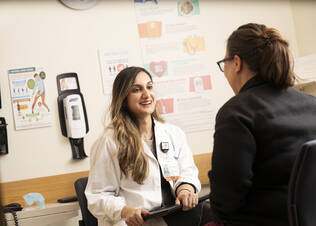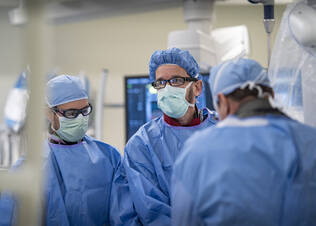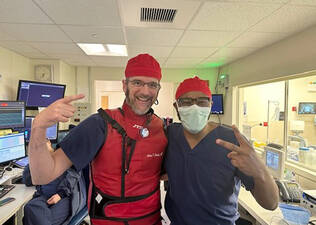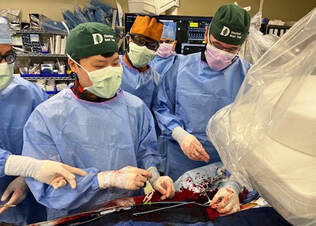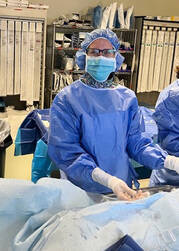Faculty members Hannah Chaudry, MD and Eric Rothstein, MD were recently featured on world-renowned Interventional Cardiologist Dr. Bill Lombardi's podcast, The Journey to Better.
Listen to the podcastInterventional cardiology training at Dartmouth Hitchcock Medical Center is designed to prepare physicians to become clinical and academic leaders in the exciting field of interventional cardiology. All of the training at our program takes place at Dartmouth Hitchcock Medical Center, a quaternary care referral center located in the Upper Connecticut River Valley offering the full range of medical and surgical cardiac services. Our catheterization laboratory has 4 state of the art labs, all with the latest Philips Azurion imaging systems with integrated intracoronary imaging and physiology.
Dartmouth Hitchcock Medical Center is a referral hospital for a very large geographic area of Northern New England, comprising large parts of Vermont, New Hampshire, Western Maine, and Eastern New York. As an interventional cardiology fellow, you will participate in the 1200 coronary PCI's that are performed yearly at Dartmouth Hitchcock Medical Center, as well as the nearly 4000 diagnostic angiography procedures. Most fellows will graduate the program with over 400 PCI’s as primary operator.
The interventional cardiology fellowship at Dartmouth Hitchcock Medical Center is Accreditation Council for Graduate Medical Education (ACGME) approved for a full year of training focusing on mastery of coronary interventional skills in the catheterization laboratory. This includes the pre-procedural, intraprocedural, and postprocedural management of patients undergoing interventional procedures. There is a heavy emphasis on intravascular imaging and physiology, including IVUS, OCT, IFR and FFR.
The lab experience is further supplemented by half day per week in the ambulatory clinic, as well as the full spectrum of didactic and clinical conferences that occur throughout the year. Interventional fellows are also allocated protected time for a dedicated research project during the year, with the amount of time allocated dependent on research goals and time needed. It is expected that all fellows completing the training program will sit for the American Board of Internal Medicine (ABIM) certification exam in interventional cardiology. Each year, we train 2 interventional fellows at our program.
Opportunities outside of routine coronary intervention includes rotations in vascular intervention in collaboration with vascular surgery and interventional radiology. Fellows during this rotation will have 4 weeks to develop expertise in various elective and emergent revascularization procedures for upper and lower extremities. We also offered dedicated time in CTO training so that interventional fellows can have some exposure to this exciting field of interventional cardiology. Dartmouth Hitchcock Medical Center has an active PERT program, and we treat over 50 patients per year with acute pulmonary embolus using catheter-directed therapies.
Interventional cardiology fellows are also crucial members of our shock team, with the ability to utilize the full range of mechanical support devices available for advanced heart failure and hemodynamic support, including right-sided and left-sided Impella, intra-aortic balloon pump, and ECMO.
Finally, interventional fellows will be exposed to some of the structural cardiac procedures including transcatheter aortic valve replacement, transcatheter edge-to-edge repair of both the mitral and tricuspid valve, and transcatheter mitral and tricuspid valve replacement. A dedicated structural year following the interventional year is also available for interested fellows who would like to further hone their expertise in structural procedures.
Dr. Eric Rothstein featured on Inside Edition
Dr. Eric Rothstein was on Inside Edition when, after preforming a life saving procedure, he was invited to play the drums in a patients band.
